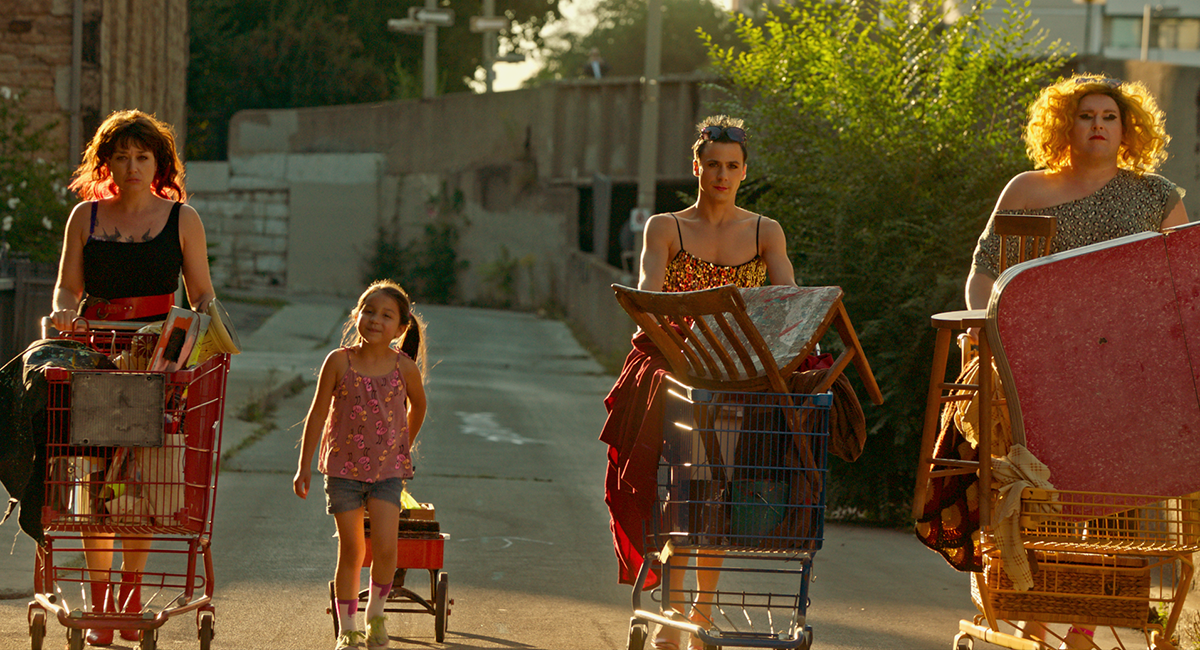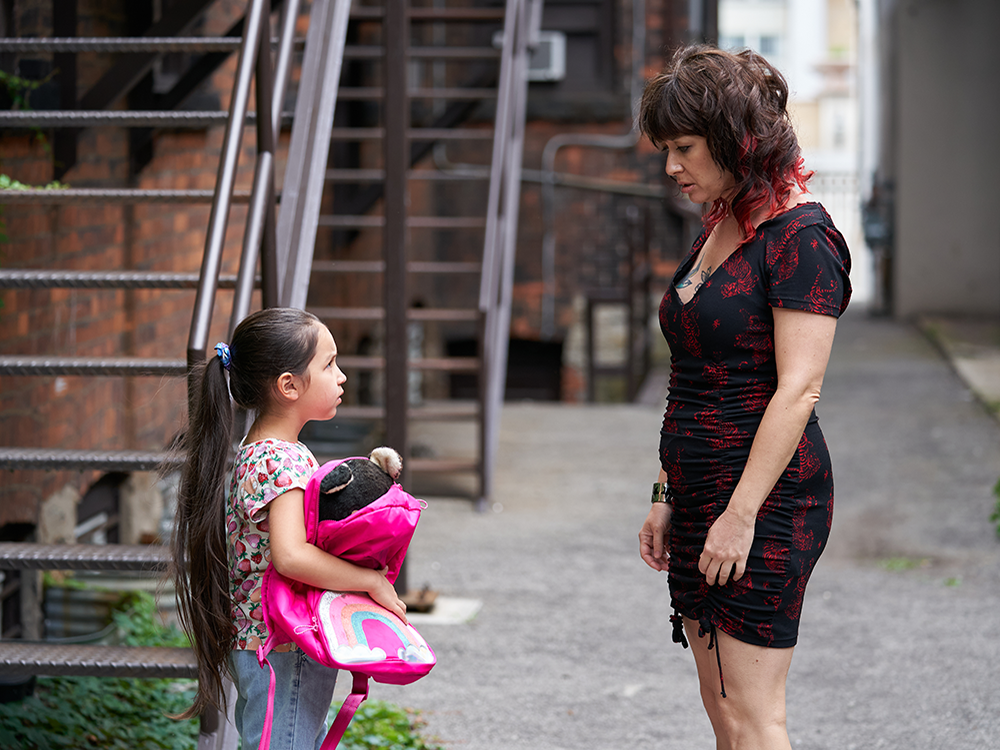Rosie has all the earmarks of a first-time feature. It’s clunky in spots with a predictable plot, and features acting that ranges from passable to a bit cringey. But at its heart, the film is sweet, good-natured and well-intentioned. And for those qualities, a great deal is forgivable.
The story begins when the titular character, a six-year-old Indigenous girl (played by Keris Hope Hill) loses her mother. Social services locates the little girl’s aunt (her mother’s adopted sister) and shows up at her doorstep, kid in tow, to tell her she’s now an instant parent. If ever there was a less likely candidate for motherhood, it would be Fred, short for Frédérique (played by Mélanie Bray).
Hiding out from her landlord because she’s three months behind on paying her rent, working in a sex shop, drinking and smoking with her two transgender sex worker pals, Fred doesn’t exactly get the Good Housekeeping seal of approval. But underneath her tough, trash-talking exterior beats the heart of a true matriarch.
Even before the arrival of six-year-old Rosie, Fred has already created a chosen family with her two friends Flo (Constant Bernard) and Mo (Alex Trahan). Despite living in the margins, the trio appear to be having a fairly good time.
The action takes place in mid-'80s Montreal, although the time period doesn’t appear to have much of an impact on the story. Really, it could be taking place anytime in recent memory. The only thing that says “'80s, baby!” are the different outfits that the characters wear in skin-tight acid neon colours, and the cavalcade of pop hits from Pat Benatar to Blondie.
Fred’s friends have their own stories that are sketched out quickly in the film’s narrative. As sex workers and roommates, they function as an ad hoc support network for Fred, offering everything from a couch for her to crash on to parenting advice. Flo’s issues with her biological family include a deeply homophobic father and a recently deceased mother, while Mo is suffering from paralyzing stage fright, which is a bit of a problem when one aspires to drag super stardom.
As a trio, they do what they can for Rosie, and she in turn brings the simple delight that comes with a child’s perspective. In spite of her grief, Rosie’s innately sunny disposition turns every moment into something of an adventure, whether that’s sleeping rough in an automotive wrecking yard or helping Mo create a drag routine that will bring down the house.

Rosie has her own ideas about what constitutes a family and is clear that all she wants is to belong to this motley crew of lovable oddballs. But larger forces are at work, namely social services, the lasting repercussions of the '60s Scoop and the ongoing trauma levied at Indigenous people. Fred’s own trauma from being taken from her family at a young age manifests as a blistering anger with authority. There are plenty of scenes of her tromping through the streets of Montreal, giving anyone who crosses her the finger.
Even as Fred struggles with the responsibility that comes with raising a child, Rosie has worked her way into her aunt’s battered heart. There are the usual bumps, missteps and bad decisions. But overall, the tone is light, purposefully so. Triumphs both big and small are a welcome change from the many recent films that present the unrelenting tragedies and injustice perpetrated on the most vulnerable in Canada.
The cheering positive aspects of the story make for an easy view, even in spite of some of the rougher edges. Métis filmmaker Gail Maurice spent a number of years trying to bring her vision of queer, Indigenous independence to movie theatres. Rosie premiered at the Toronto International Film Festival and is rolling out across the country, opening in theatres on Nov. 11.
Given the backbreaking amount of effort to bring a film to fruition, it can feel like something of a minor miracle that a Canadian narrative feature will secure national distribution. It feels a little churlish to wish the film was slightly better than it is.
But all the efforts to bring Rosie to a Canadian audience surfaces a few other issues, not just the sad state of affairs in terms of film production, but also that stories with bounce, fun and sass are few and far between.
There is tendency in Canadian film to go for broke with seriousness, as if to reaffirm one’s commitment to the art of cinema. Somewhere along the line, pleasure seems to have flown out the window. The parade of sad gritty dramas or self-serious documentaries, one after another, becomes a bit of a masochistic pursuit after a while.
This is certainly not a revelatory idea. The drearier aspects of Canadian film have been long noted. SCTV did perhaps the all-time greatest takedown with their Canadian Movie of the Week: Garth and Gord and Fiona and Alice. Another supreme moment of silliness was Power Play, starring John Candy as the reluctant hockey enforcer Billy Stemhovilichski. Seek it out and watch if you can.
The often distinctly unfun quality of Canadian film occurred to me all over again after a recent bout of screening a number of features and documentaries from Canadian filmmakers. At a certain point in the ongoing slog of watching sad people in sadder situations, I simply wanted to disembark and step off the ship in search of some sillier fare. Anything to break up the ice floes of grimness.
Anything with some humour and cheekiness feels like such an incredible relief. Slash/Back was a recent example. Fun, a bit frightening, but filled with a ferocious kick-ass spirit. I could have cried from gratitude.
Although Rosie isn’t quite as revelatory as Slash/Back, its sparky edge feels a world away from the grey ennui of many Canadian features. More, please!
‘Rosie’ screens in Vancouver at Cineplex Odeon International Village Cinemas from Nov. 11 to 17. ![]()
Read more: Indigenous, Film

















Tyee Commenting Guidelines
Comments that violate guidelines risk being deleted, and violations may result in a temporary or permanent user ban. Maintain the spirit of good conversation to stay in the discussion.
*Please note The Tyee is not a forum for spreading misinformation about COVID-19, denying its existence or minimizing its risk to public health.
Do:
Do not: